| This article is part of a series on the |
| Politics of Germany |
|---|
 |
| Constitution (Basic Law) |
| Head of State |
|
Executive
|
|
Legislature
|
Judiciary
|
|
Subdivisions
|
Elections
|
State and local politics
|
Foreign relations
|
|
Political ideologies
|
In the federal system of the Federal Republic of Germany, the state parliaments embody the legislative power in the sixteen states. In thirteen of the sixteen German states, the state parliament is known as the Landtag (an old German term that roughly means state parliament). In the states Free Hanseatic City of Bremen and Free and Hanseatic City of Hamburg, the state parliament is called Bürgerschaft (Citizenry), in Berlin it is called Abgeordnetenhaus (House of Representatives).
Constitutional functions and powers
As the German constitution (Basic Law) defines the Federal Republic of Germany as a federation, each German state has its own constitution. The Basic Law gives the states a broad discretion to determine their respective state structure, only stating that each German state has to be a social and democratic republic under the rule of law and that the people in every state must have an elected representation, without giving further details (Article 28.1). This provision only excludes a constitutional monarchy (as the states have to be republics) and otherwise theoretically allows for a wide range of democratic forms of government. In practice, all states are parliamentary republics in which the legislative branch of government is assigned to an elected parliament and the executive branch of government is subject to parliamentary confidence. Since the abolition of the Bavarian Senate in 1999, which had previously been the upper house of a bicameral legislature, all sixteen state parliaments are unicameral.
Among the most important functions of the state parliaments are the election of the Minister-President (in some states also the cabinet ministers), the control of the state government and the adoption of state laws. They have no direct influence on federal legislation, but participate in the election of the President of Germany by electing state delegates to the Federal Convention.
Election process
Similar to federal elections, many states use a mixed-member proportional representation system in which each voter casts one vote for a constituency candidate and a second vote determines the proportional share of seats. However, this is not the case in all states, the main exception being Baden-Württemberg, which uses a complex first-past-the-post voting system in which seats are allocated to "lucky-loser" candidates in addition to the elected constituency candidates in order to establish proportionality. In all states there is a 5%-threshold which must be exceeded for a party to be considered in the proportional distribution of seats, although in Bremen it is sufficient to exceed the threshold in only one of the two cities that make up the state (Bremen City and Bremerhaven). The electoral system of some states also includes a basic mandate clause which allows parties to be taken into account in the proportional distribution of seats regardless of the 5%-threshold if they win a certain number of constituencies. As at the federal level, parties representing national minorities are excluded from both the 5%-threshold and the basic mandate clause. This provision is of particular importance in Schleswig-Holstein, where the SSW, a party which represents the minorities of Danes and Frisians, regularly participates in state elections.
In contrast to the Bundestag on federal level, most states have adopted legislative periods of five years, the only exception being Bremen, which still uses four-year-terms (a cross-party attempt to introduce five-year-terms was defeated in a referendum in 2017). Another difference to the Bundestag are the conditions for early new elections: While the Bundestag does not have the right of self-dissolution and can only be dissolved by the President of Germany (and even this only under certain conditions which are precisely defined in the Basic Law), the state parliaments have the right of self-dissolution (even if the procedure differs according to the state constitutions). In addition to this, some state constitutions also provide for an automatic dissolution of the parliament in certain parliamentary deadlock-situations and in some states, the parliament can also be dissolved by a referendum. Neither an automatic dissolution nor a dissolution by referendum has ever happened in any state, though. In October 2021, an attempt to bring about a referendum about the dissolution of the Bavaria state parliamtent failed; the request was supported by 204,135 citizens eligible to vote, thus clearly failing to meet the threshold of one million signatures of support necessary to call a referendum.
Comparative table
| State | Name | Election system | Threshold conditions | Seats | Term | Premature dissolution procedures |
|---|---|---|---|---|---|---|
| Baden-Württemberg | Landtag of Baden-Württemberg | first-past-the-post in 70 constituencies with at least 50 "lucky loser"-seats (Zweitmandate) at the administrative district level, in order to achieve proportional representation | 5% of votes statewide | 120+ | 5 years | -self dissolution (motion must be tabled by at least one quarter and accepted by at least two-thirds of members) -referendum (request must be made by at least one sixth of the state population eligible to vote and must be accepted by a majority of the population eligible to vote) |
| Free State of Bavaria | Landtag of Bavaria | mixed-member proportional representation with two votes (both votes counting towards proportional representation) | 5% of votes statewide | 180+ | 5 years | -self dissolution (simple motion sufficient) -referendum (request must be made by at least one million citizens eligible to vote and must be accepted by a simple majority) -automatic dissolution (if the Landtag fails to elect a Minister-President within four weeks after a vacancy occurred) |
| Berlin | House of Representatives of Berlin | mixed-member proportional representation with two votes | 5% of second votes statewide or one constituency |
130+ | 5 years | -self dissolution (motion must be accepted by two-thirds of members) -referendum (state constitution does not specify details) |
| Brandenburg | Landtag of Brandenburg | mixed-member proportional representation with two votes | 5% of second votes statewide or one constituency |
88+ (maximum of 110) | 5 years | -self dissolution (motion must be accepted by two-thirds of members) |
| Free Hanseatic City of Bremen | Bürgerschaft of Bremen | Personalized proportional representation with cumulative voting and panachage (five votes) in two separate voting areas (Bremen City and Bremerhaven) | 5% of votes in one of the two voting areas | 87 (72 for Bremen City and 15 for Bremerhaven) | 4 years | -self dissolution (motion must be tabled by at least one third and must be accepted by at least two-thirds of members) -referendum (request must be made by at least one fifth of the state population eligible to vote and must be accepted by a majority of the population eligible to vote) |
| Free Hanseatic City of Hamburg | Bürgerschaft of Hamburg | Personalized proportional representation with cumulative voting and panachage on state level and in multi member constituencies (10 votes: 5 for state lists, 5 for constituency candidates) | 5% of state list-votes | 121+ | 5 years | -self dissolution (motion must be tabled by at least one quarter and must be accepted by a majority of members) |
| Hesse | Landtag of Hesse | mixed-member proportional representation with two votes | 5% of second votes statewide | 110+ | 5 years | -self dissolution (motion must be accepted by a majority of members) |
| Lower Saxony | Landtag of Lower Saxony | mixed-member proportional representation with two votes | 5% of second votes statewide | 135+ | 5 years | -self dissolution (the state constitution defines two scenarios for a self dissolution: one third of members may table a motion of self dissolution, which must be accepted by two-thirds of members present, who have to equal at least a majority of all members . Nonwithstanding variant A, the Landtag may dissolve itself with a majority of members, if it has failed to elect a Minister-President within 21 days after a vacancy occurred – alternatively it may elect a Minister-President with a plurality of votes ) |
| Mecklenburg-Vorpommern | Landtag of Mecklenburg-Vorpommern | mixed-member proportional representation with two votes | 5% of second votes statewide | 71+ | 5 years | -self dissolution (the state constitution defines two scenarios for a self dissolution: one third of members may table a motion of self dissolution, which must be accepted by two-thirds of members . Nonwithstanding variant A, the Landtag may dissolve itself with a majority of members, if it has failed to elect a Minister-President within 28 days after a vacancy occurred – alternatively it may elect a Minister-President with a plurality of votes ) |
| North Rhine-Westphalia | Landtag of North Rhine-Westphalia | mixed-member proportional representation with two votes | 5% of second votes statewide | 181+ | 5 years | -self dissolution (motion must accepted by a majority of members) |
| Rhineland-Palatinate | Landtag of Rhineland-Palatinate | mixed-member proportional representation with two votes | 5% of second votes statewide | 101+ | 5 years | -self dissolution (simple motion) -automatic dissolution (if a motion of no confidence against the Minister-President has been successful and the Landtag fails to elect a new office-holder within four weeks) |
| Saarland | Landtag of Saarland | proportional representation with one vote, which counts both for a list in a multi member constituency and a state list | 5% of votes statewide | 51(+?) | 5 years | -self dissolution (motion must be accepted by two-thirds of members) -automatic dissolution (if a motion of no confidence against the Minister-President has been successful and the Landtag fails to elect a new office-holder within four weeks) |
| Free State of Saxony | Landtag of Saxony | mixed-member proportional representation with two votes | 5% of second votes statewide or two constituencies |
120+ | 5 years | -self dissolution (motion must be accepted by two-thirds of members) -automatic dissolution (if the Landtag fails to elect a Minister-President within four months after a vacancy occurred) |
| Saxony-Anhalt | Landtag of Saxony-Anhalt | mixed-member proportional representation with two votes | 5% of second votes statewide | 83+ | 5 years | -self dissolution (the state constitution defines two scenarios for a self dissolution: one fourth of members may table a self dissolution motion, which has to be accepted by two-thirds of members. This is however not possible during the first six months of a legislative period . Nonwithstanding variant A, the Landtag may dissolve itself with a majority of members, if it has failed to elect a Minister-President on the first two ballots – alternatively it may elect a Minister-President with a plurality of votes on the third ballot ) |
| Schleswig-Holstein | Landtag of Schleswig-Holstein | mixed-member proportional representation with two votes | 5% of second votes statewide or one constituency |
69+ | 5 years | -self dissolution (motion must be accepted by at least two-thirds of members) |
| Free State of Thuringia | Landtag of Thuringia | mixed-member proportional representation with two votes | 5% of second votes statewide | 88+ | 5 years | -self dissolution (motion must be tabled by at least one third and must be accepted by at least two-thirds of members) -automatic dissolution (if the Minister-President has lost a confidence motion and the Landtag fails to elect a new Minister-President within 21 days) |
- The electoral system of Saarland has a regulatory gap for the (unlikely but theoretically possible) case that a party is proportionally entitled to more seats in the multi member constituencies than would be the case on state level. The election law code does not state, whether this would lead to overhang or even compensation seats or whether the relevant party would lose its entitlement to the overhang mandates.
List of state parliaments
| Plenar hall | Name | Legislative period |
Diagram | President | Last election | Next election | |||
|---|---|---|---|---|---|---|---|---|---|
 Baden-Württemberg |
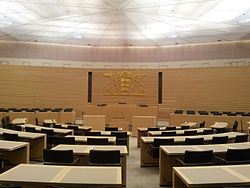
|
Landtag | 17th | 1958184217 | 
|
Muhterem Aras Alliance 90/The Greens since 11 May 2016 |
2021 | 2026 | |
| Government (100) Alliance 90/The Greens (58) CDU (42) Opposition (54) SPD (19) FDP (18) AfD (17) | |||||||||
 Free State of Bavaria |
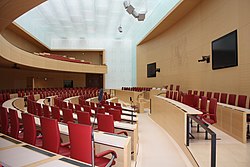
|
Landtag | 19th | 1732853732 | 
|
Ilse Aigner CSU since 5 November 2018 |
2023 | 2028 | |
| Government (122) CSU (85) Free Voters (37) Opposition (81) AfD (32) Alliance 90/The Greens (32) SPD (17) | |||||||||
 Berlin |

|
Abgeordnetenhaus | 19th | 21343452162 | 
|
Cornelia Seibeld CDU since 16 March 2023 |
(2021) 2023 |
2026 | |
| Government (86) CDU (52) SPD (34) Opposition (73) Alliance 90/The Greens (34) The Left (21) AfD (16) Non-inscrits (2) | |||||||||
 Brandenburg |
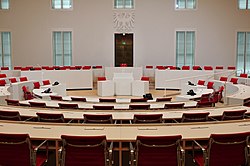
|
Landtag | 8th | 32141230 | 
|
Ulrike Liedtke SPD since 25 September 2019 |
2024 | 2029 | |
| Government (46) SPD (32) BSW (14) Opposition (42) AfD (30) CDU (12) | |||||||||
 Free Hanseatic City of Bremen |
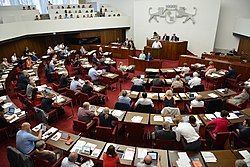
|
Bürgerschaft | 21st | 10271052492 | 
|
Antje Grotheer SPD since 29 June 2023 (second term) 27 March 2019–3 July 2019 (first term) |
2023 | 2027 | |
| Government (47) SPD (27) Alliance 90/The Greens (10) The Left (10) Opposition (40) CDU (24) Bündnis Deutschland (9) FDP (5) Non-inscrits (2) | |||||||||
 Free Hanseatic City of Hamburg |

|
Bürgerschaft | 22nd | 1253331564 | 
|
Carola Veit SPD since 23 March 2011 |
2020 | 2025 | |
| Government (86) SPD (53) Alliance 90/The Greens (33) Opposition (37) CDU (15) The Left (12) AfD (6) Non-inscrits (4) | |||||||||
 Hesse |

|
Landtag | 21st | 232285228 | 
|
Astrid Wallmann since 31 May 2022 |
2023 | 2028 | |
| Government (75) CDU (52) SPD (23) Opposition (58) AfD (28) Alliance 90/The Greens (22) FDP (8) | |||||||||
 Lower Saxony |
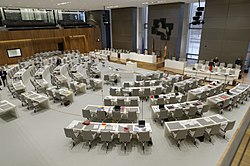
|
Landtag | 19th | 57244718 | 
|
Hanna Naber SPD since 8 November 2022 |
2022 | 2027 | |
| Government (81) SPD (57) Alliance 90/The Greens (24) Opposition (65) CDU (47) AfD (18) | |||||||||
 Mecklenburg-Vorpommern |
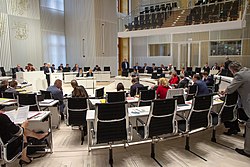
|
Landtag | 8th | 934551214 | 
|
Birgit Hesse SPD since 22 May 2019 |
2021 | 2026 | |
| Government (43) SPD (34) The Left (9) Opposition (36) AfD (14) CDU (12) Alliance 90/The Greens (5) FDP (5) | |||||||||
 North Rhine-Westphalia |
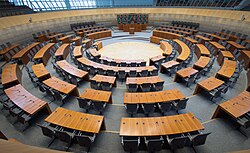
|
Landtag | 18th | 56391276111 | 
|
André Kuper CDU since 1 June 2017 |
2022 | 2027 | |
| Government (115) CDU (76) Alliance 90/The Greens (39) Opposition (80) SPD (56) FDP (12) AfD (11) Non-inscrits (1) | |||||||||
 Rhineland-Palatinate |

|
Landtag | 18th | 399631664 | 
|
Hendrik Hering SPD since 18 May 2016 |
2021 | 2026 | |
| Government (55) SPD (39) Alliance 90/The Greens (9) FDP (6) Opposition (46) CDU (31) AfD (6) Free Voters (6) Non-inscrits (4) | |||||||||
 Saarland |

|
Landtag | 17th | 29193 | 
|
Heike Becker SPD since 25 April 2022 |
2022 | 2027 | |
| Government (29) SPD (29) Opposition (22) CDU (19) AfD (3) | |||||||||
 Free State of Saxony |
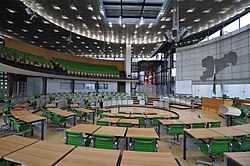
|
Landtag | 8th | 61071541401 | 
|
Alexander Dierks CDU since 01 October 2024 |
2024 | 2029 | |
| Government (51) CDU (41) SPD (10) Opposition (69) AfD (40) BSW (15) Alliance 90/The Greens (7) The Left (6) Non-inscrits (1) | |||||||||
 Saxony-Anhalt |
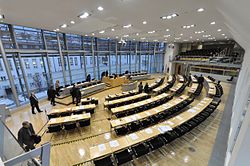
|
Landtag | 8th | 129674023 | 
|
Gunnar Schellenberger CDU since 6 July 2021 |
2021 | 2026 | |
| Government (56) CDU (40) SPD (9) FDP (7) Opposition (41) AfD (23) The Left (12) Alliance 90/The Greens (6) | |||||||||
 Schleswig-Holstein |
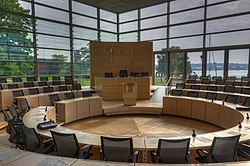
|
Landtag | 20th | 12144534 | 
|
Kristina Herbst CDU since 07 May 2022 |
2022 | 2027 | |
| Government (48) CDU (34) Alliance 90/The Greens (14) Opposition (21) SPD (12) FDP (5) SSW (4) | |||||||||
 Free State of Thuringia |

|
Landtag | 8th | 126152332 | 
|
Thadäus König CDU since 28 September 2024 |
2024 | 2029 | |
| Government (44) CDU (23) BSW (15) SPD (6) Opposition (44) AfD (32) The Left (12) |
- On 16 November 2022, the Constitutional Court of Berlin declared the 2021 Berlin state election invalid due to irregularities. The election had to be repeated with the same lists and candidates within 90 days, resulting in a repeat election on 12 February 2023. Since this was a repeat election, the legislative period continues as scheduled and the next regular Berlin state election will be held in 2026.
Groupings
Main article: Group status in German state parliamentsReferences
- "Volksentscheid und Bundestagwahl: So hat Bremen abgestimmt – WESER-KURIER". 25 September 2017.
- "Verfassung des Landes Baden-Württemberg".
- "Verfassung von Berlin – Abschnitt III: Die Volksvertretung". March 2016.
- "Wahlsystem der Abgeordnetenhauswahl 2016 in Berlin".
- "Wahlsystem der Bürgerschaftswahl 2019 in Bremen (#HBWahl)".
- "Regelungslücke im saarländischen Landeswahlgesetz".
- "Wahltermine in Deutschland (2021, 2022 usw.)".